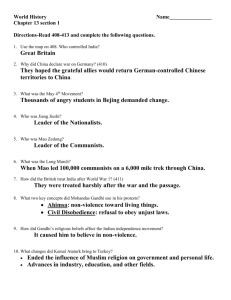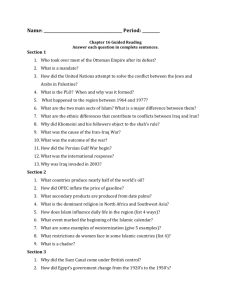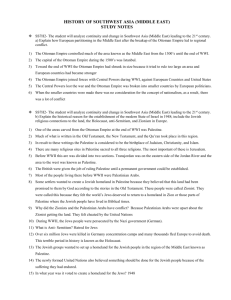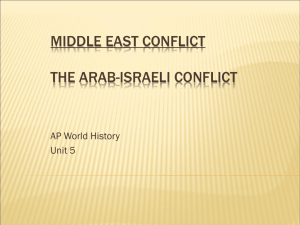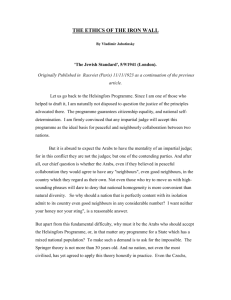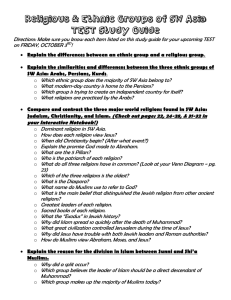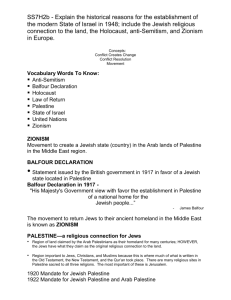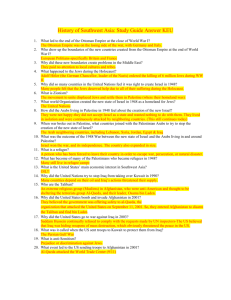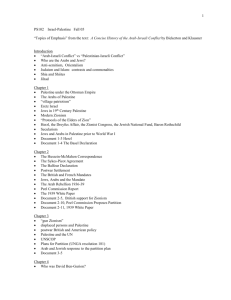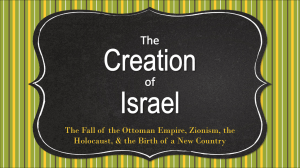History - Southwest Asia
advertisement
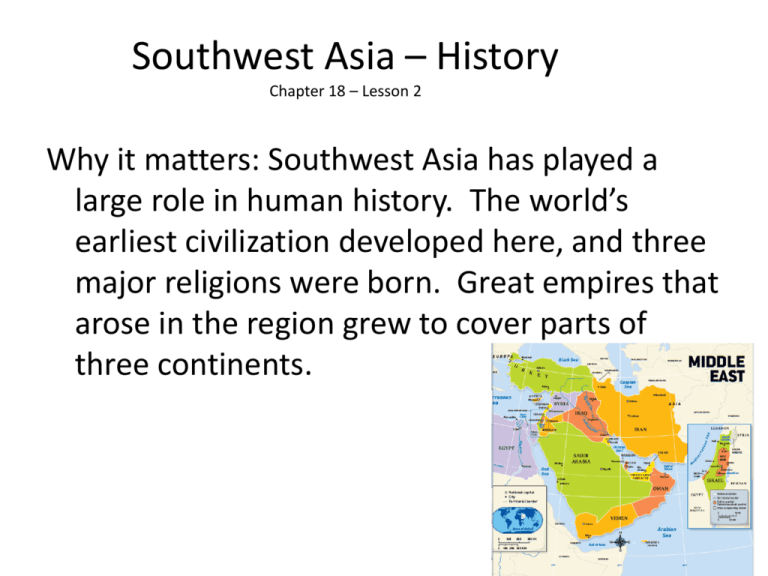
Southwest Asia – History Chapter 18 – Lesson 2 Why it matters: Southwest Asia has played a large role in human history. The world’s earliest civilization developed here, and three major religions were born. Great empires that arose in the region grew to cover parts of three continents. Questions you should be able to answer when we’re done…… What are some of the most important advancements that occurred in Southwest Asia in ancient times? What present day issues facing Southwest Asia have their roots in ancient times? Vocab we’ll Learn today: Polytheism Millennium Monotheism Text Resource: Mesopotamia Mesopotamia Fertile Area between Tigris and Euphrates Rivers (Present Day Iraq). Staying in one place… • • • • • • • Sumerians Babylonians Irrigation Pyramids Mathematics Astronomy Government Cuniform • Epic of Gilgamesh • Shaped later civilizations in Greece, Rome and the West Birthplace of Religions Ancient times – Polytheism During second millennium B.C…….Monotheism (Millennium is a period of 1000 years). 2000 B.C. – Isrealites – Judaism 30 A.D. – Jesus – Christianity 600’s A.D. – Muhammad – Islam All are Monotheistic All regard Abraham as the messenger of God who first taught Monotheism. Mono = One Theism = Belief in god or gods Islam • • • • Announced by Muhammad in Mecca 5 pillars of Islam (see next slide) Muhammad’s successors – Caliphs Arab armies began spreading the religion though military conquest, as well as scholars, religious pilgrims, and Arab traders. 5 Pillars of Islam • Promising faith to God and accepting Muhammad as God’s prophet • Praying 5 times daily • Fasting during Ramadan • Aiding the poor and unfortunate • Pilgrimage to Mecca Islam Expands • By 800 A.D. - all of Southwest Asia and part of Turkey. • Extended into Most of Spain and Portugal • Across Northern Africa. • Later expanded to Eastern African and Central Asia Islamic Society • Rich in knowledge, skills, ideas. • Great works of architecture • Centers of learning. 1100’s + 1200’s • Crusaders from Western Europe set up Christian states along Southwest Asia’s Med. Coast. • Muslim’s regained some of these areas, but in other parts their control weakened. Mongol Empire • 1200’s Persia (Iran) & Mesopotamia (Iraq) • Led by the grandson of Genghis Khan • Result – Islamic world fragmented. (for a while) Ottoman Empire • Muslim tribes who began building an empire on the Anatolian Peninsula in the early 1200’s. • By mid 1300’s, empire included much of western SW Asia and parts of SE Europe and N. Africa. • Reached the peak of its power in the 1500’s The Ottoman Empire was being called the “Sick man of Europe” and Great Britain, France and Russia were all “waiting for it to die” WWI • Allies – Great Britain – France – Russia • Central Powers – Germany – Austria-Hungary – The Ottoman Empire joined with the Central Powers…. Decline of the Ottoman Empire • Lost areas in in Africa and Europe through wars, treaties, revolutions. • On the side of the Central Powers in WWI (the losing side). • Result of the war – empire dissolved. • Modern day Turkey founded on the Anatolian Peninsula. Mandates….. • After WWI, Britain and France divided the empires territories into Mandates… • New boundaries did not respect ethnic, religious, political or historical divisions. • Caused resentment toward the European colonial powers. • Between 1930 – 1971 country after country won independence. Palestine…… • Area roughly same as historic Israel. • Most of modern population = Muslim Arabs Arabs & Jews • By the mid 1940’s – Iraq, Jordan, Syria and Lebanon had been established as independent countries. • The fate of Palestine was still undecided – and it created a dilemma for GB. – Two groups claimed it as a homeland • Arabs • Jews Two groups – one spot • Arabs had lived in Palestine for centuries. • Many people could trace their ancestry to the earliest settlers. • Jews had historical ties to Palestine. • Ancestors had migrated to this region beginning around 1900 B.C. – the Hebrews. • Their ancient kingdom was defeated, and many Jews migrated to other places The Jews • By the late 1800’s there were about 10 million Jews scattered throughout the world • They faced discrimination and were persecuted. • Fearing the increasing oppression many began to emigrate – believing that the only way to solve the problem of oppression was to return to the homeland – Palestine – to create a country with their own government. • Zionists – First groups arrived in 1882. By 1914 there were almost 85,000. • Zionists put pressure on GB and other nations to support their plan for an independent homeland. • 1917 – British Govt issued the Balfour Declaration – it stated Britain's support for the creation of a Jewish national home in Palestine without violating the rights of Arabs living there. Balfour Declaration • “His Majesty’s Government view with favor the establishment in Palestine of a national home for the Jewish people, and will use their best endeavors to facilitate the achievement of this object., it being clearly understood that nothing shall be done which may prejudice the civil and religious rights of existing non-Jewish communities in Palestine, or the rights and political status enjoyed by Jews in any other country” Reaction • Arabs were shocked and upset – They had been led to believe that all Arabs would have selfdetermination and Palestine would become part of a larger independent Arab country. • Great Britain continued to play both sides – Sent representatives to the Arabs to tell the their goal was still self-determination – Still supported The creation of a Jewish homeland • As Britain searched for a way to solve the problem, the struggle between the Jews and Arabs in Palestine became increasingly violent. • As Jewish immigration increased, the Arabs felt more and more threatened • Finally, the Arabs revolted by boycotting Jewish business and burning bridges and crops, the Jews retaliated and people on both sides were killed Meanwhile….. in the rest of the world • Hitler came to power in Germany and began to persecute the Jews. • Thousands MORE fled to Palestine. • 1933 – 85,000 Jews in Palestine • 1939 – 445,000 Jews in Palestine • More tension between Britain, the Jews and the Arabs • Britain decided to limit Jewish immigration leaving Jews stranded in Germany and other parts of Europe. • The Jewish response in Palestine was guerrilla warfare against the British. After WWII • Nearly 6 million Jews had died in Nazi concentration camps • Thousands of survivors had no place to go. • There was a worldwide outpouring of support for a Jewish homeland in Palestine. Status of Palestine after WWII • 70% of Palestine's population was ARAB. • Opposed to a Jewish state in their country. • “Why should they give up their land because of what the Nazis had done?” • As the call for a Jewish homeland grew, Arab countries formed the ARAB LEAGUE and announced support for the Arabs in Palestine (Egypt, Syria, Lebanon, TransJordan, Iraq, Saudi Arabia, Yemen) Great Britain Bails…. • 1947 – GB figured out that it couldn’t find a solution to the problem • It withdrew from Palestine and turned the problem over to the United Nations. Creation of Israel - part I • The UN special committee recommended that Palestine be portioned into two states – one Arab and one Jewish. • Jerusalem – sacred to Jews, Christians and Muslims would be designated an “International City”. • The Jews accepted but the Arabs were Furious Why were the Arabs upset? • The Jews would get more than ½ the total land even though they had less than 1/3 the people. • Much of the coast fell within the Jewish state (The Arabs got the upland and desert). Results…. • Arabs warned that dividing Palestine would result in war but the UN voted to approve the division. • May 1948 – New independent state of Israel was announced. • Neighboring Arab countries attacked within HOURS. • By the end of the 1948 war, Israel controlled almost ¾ of Palestine – including half of Jerusalem. • Jordan and Egypt divided the rest of Palestine between them. • The Palestinians were left with no country at all. Conflict Continues • 1967 War Israel captured: West Bank, East Jerusalem, Sinai Peninsula, Gaza Strip, Golan Heights. • Israel withdrew from Sinai in 1982 • Israel withdrew from Gaza in 2005. • Conflict continues today. Recap…… • Both Jews and Palestinians wanted the land of Palestine • Great Britain made promises to both groups • Support for the Jews grew after WWII • Britain gave up and tossed it back to the UN • The UN decided to create Israel • The Arabs attacked and LOST the war • Palestinians were left with no country at all. Not the only conflicts… • • • • • • • • Civil wars: Lebanon, Afghanistan, Yemen. Kurds in many countries Revolution in Iran – 1970’s. Iraq invaded Iran in 1980 (8 year war) Iraq annexed Kuwait – First Gulf War US invasion of Afghanistan (response to 9/11) 2nd Gulf War (Saddam Hussein) Democratic movements in Yemen, Bahrain, Syria Why? • Islamists consider Islam to be a POLITICAL system as well as a religion. • Oil Reserves • Ethnic differences. Example: 1979 - Revolution • Prior to 1979, Iran had a pro-western leader (The Shah). • The people revolted – the shah fled. • Ayatollah Khomeini set up a new government and declared an Islamic republic. • Immediately tried to get rid of all Western influences – Westerners forced to leave – Alcohol outlawed – Women back to wearing the chadors • New leader was a Shiite Muslim, and called on Muslims everywhere to overthrow their governments and establish Shiite Islamic republics. This was particularly powerful to Shiites who lived in countries run by Sunni Muslims where Shiites were an oppressed minority. • This was one reason Iraq attacked Iran in 1980. • Split the Island into two. • Some Greek Cypriots wanted to unite with Greece • 1974 – Turkey sent troops to prevent that union. • Turkey declared the northeastern part of Cyprus independent in 1983. • Most other countries don’t recognize this. • Picture (2008) Turkish people gather on Ledra Street during opening ceremony of the Lokmaci crossing point in Nicosia, Cyprus, on Thursday. The crossing point has symbolized the decades-old division of the Mediterranean island. Another Example Civil War – 1960’s Cyprus Question 1 How did the shift from hunting and gathering to agriculture affect the way of life of early peoples? A) Their way of life became nomadic B) Their way of life focused more on hunting C) Their way of life began to be less settled and more insecure D) Their way of life began to be more settled an villages began to appear Question 2 In what way are the religions of Islam, Judaism, and Christianity alike? A) They began in 2000 B.C.. B) They are monotheistic C) They are polytheistic D) They regard Job as the messenger of God. Question 3 What people conquered Mesopotamia and Persia in the A.D. 1200’s? A) Muslims B) Babylonians C) Ottomans D) Mongols Question 4 Following WWI, how did Britain and France divide the territory of the former Ottoman Empire? A) By setting boundaries based on historical divisions B) By creating boundaries that ignored ethic backgrounds C) By creating boundaries based on population distribution D) By creating boundaries based on religious divisions Question 5 What event triggered the first Persian Gulf War in the 1990’s? A) Iraq’s invasion of Kuwait B) Iraq’s invasion of Iran C) U.S. Invasion of Afghanistan D) Israel’s capture of the West Bank Question 6 What change began to take place in Mesopotamia around 10,000 years ago? Question 7 What are some ways in which Islam was spread? Question 8 How did the political boundaries of the former Ottoman Empire territories cause problems later? Question 9 What are the roots of the conflict between Arabs and Jews in the region? Question 10 Who are the Kurds, and why are they involved in conflict? Question 11 What event in Europe helped spur the creation of a Jewish state in Southwest Asia Define: Polytheism Millennium Monotheism Unofficial Vocab • Secular – without religious influence • Shah – Ruler (like a king) • Ayatollah – religious leader More Unofficial Vocab • Mandate – Land to be governed by an outside power on behalf of the League of Nations until it was ready for independence • Zionist – Jews who believed that the only way to solve the problem of oppression was by returning to the place they perceived as their homeland . • Self-determination – the right to decide your own political future So…… What are some of the most important advancements that occurred in Southwest Asia in ancient times? What present day issues facing Southwest Asia have their roots in ancient times? Intriguing Person: Ataturk – father of the Turks • Kemal was a young army officer who began a movement to establish Turkey as an independent republic. • 1923 Kemal overthrew the Sultan and was elected president of the new republic. Changes….. • Sweeping Political and Social reforms were needed for Turkey to survive….. • Broke bond with Islam – Religious leaders were no longer involved in government • Outlawed the fez (brimless flattopped hat) and discouraged the veil for women. • Women could now vote and hold office • Everyone was encouraged to attend school.
